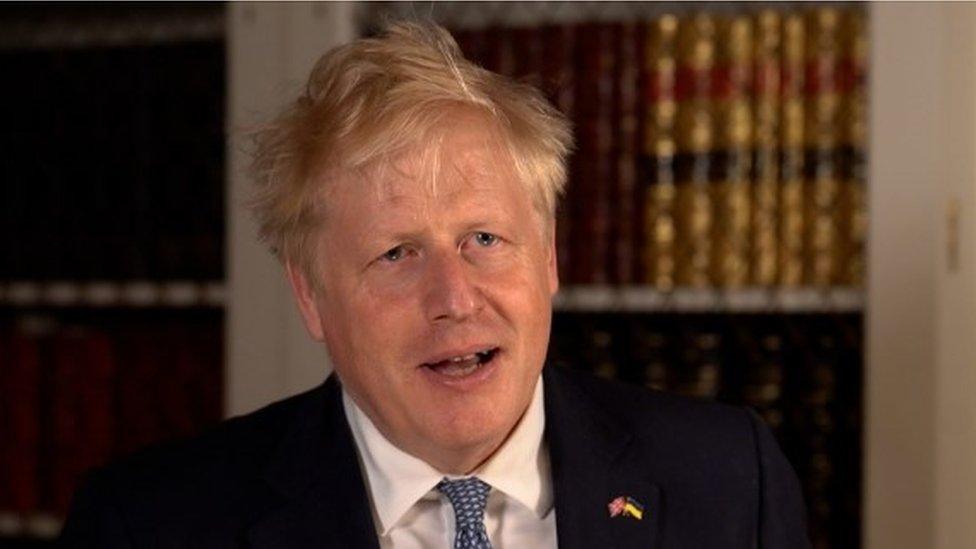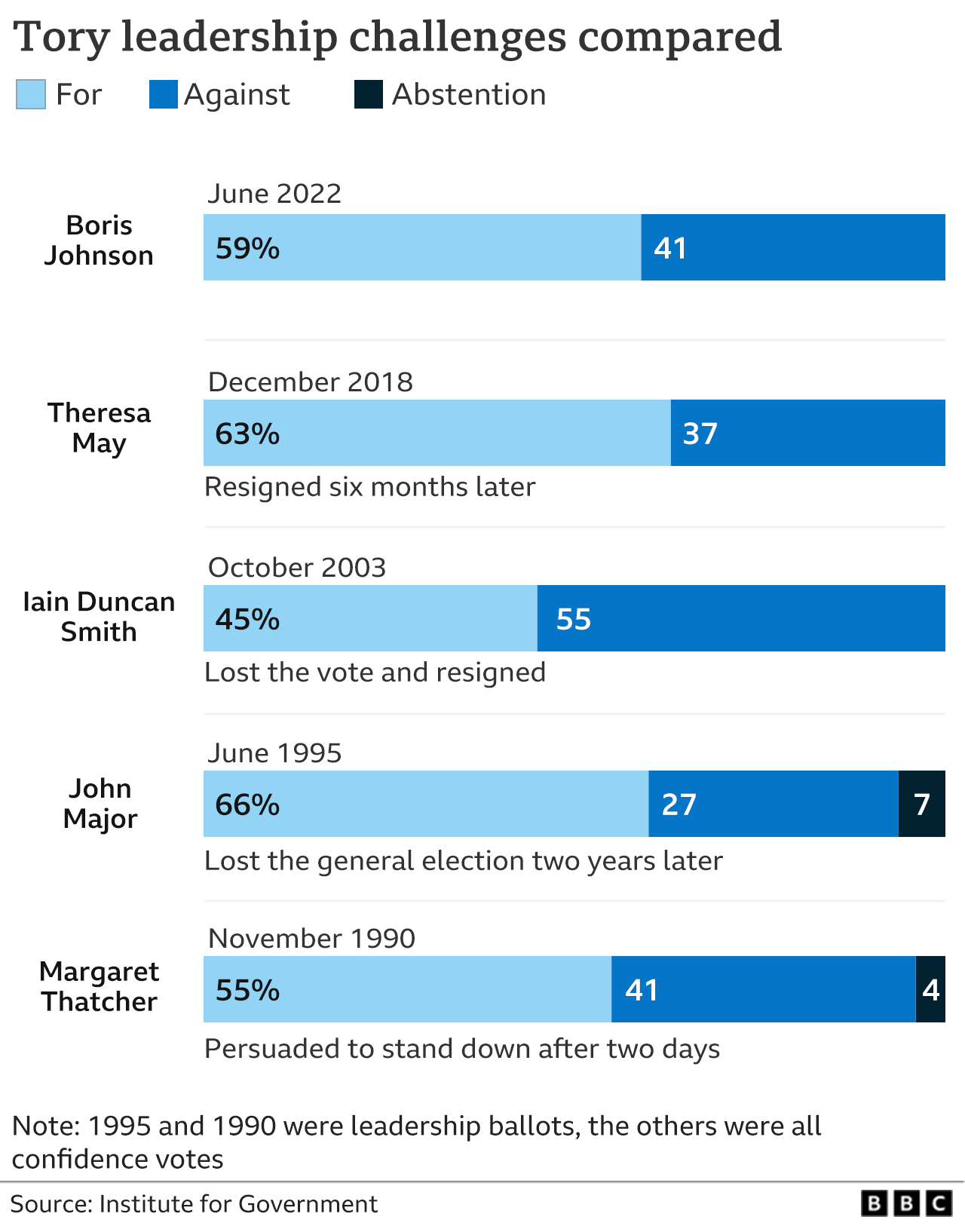Boris Johnson: What threats does he now face to his job?
- Published

Boris Johnson has survived an attempt by his own MPs to oust him as Conservative Party leader and prime minister in a confidence vote. But the scale of the rebellion against him means he is not out of the woods yet. What's the next move for Tory rebels and Johnson loyalists?
Boris Johnson used to make his party feel good. Anyone who has watched the prime minister work the crowd at a Conservative Party conference will have seen the effect he has on activists.
But that feelgood factor was hard to find among Tory MPs in Parliament this morning.
Yes, the prime minister won Monday night's confidence vote.
But any hope he had that his party would now move on was obliterated by the result - and the fact 41% of MPs who voted said they wanted Boris Johnson out.
One MP arriving in Parliament on Monday morning lamented simply: "It's not good."
The rebellion was much bigger than many expected - and that exposes a divided party.
A prominent rebel said: "The cabinet should tell him to go but they won't because they are too weak - he kept them weak."
But what happens next?
Another confidence vote
In theory, the prime minister is safe from another confidence vote for a year.
Under the current rules of the 1922 committee, which organises leadership contests, another challenge can't happen for 12 months after the incumbent wins.
But not everyone is convinced.
"All this assumption that he's safe for a year - I don't think anyone believes that," one backbencher told me this morning.
Watch: The moment Sir Graham Brady announces Boris Johnson won the confidence vote
The committee had considered changing the rules under Theresa May's premiership, to allow a second confidence a few months after she won a first.
Rebels are already talking about how they could force another vote on Boris Johnson's future.
"There will be huge pressure on [1922 committee chairman] Sir Graham Brady to change the rules," says a senior critic of the PM.
It's not guaranteed that change to the process will happen. My sources on the committee have talked of needing a period of calm.
But there are big political pitfalls ahead too, which could change minds.
Crunch date with the electorate
The subject currently dominating talk among Tory MPs is the two by-elections later this month.
On 23 June, the Conservatives will be looking to defend Wakefield, in West Yorkshire, and Tiverton and Honiton in Devon. Labour are aiming to take back Wakefield, one of the "Red Wall" northern strongholds that they lost in Boris Johnson's 2019 landslide.
The Lib Dems are throwing everything they have got at Tiverton and Honiton, where the Tories have a 24,000 majority, in the hope of pulling off another upset in the so-called "Blue Wall" of Tory heartland seats in the south.
Senior Tories fear they will lose both contests - plunging Boris Johnson's leadership into a fresh crisis.
A senior rebel I spoke to this morning said his focus will now be trying to change the minds of enough Tory MPs to shift the balance of power away from the prime minister.
They believe if they can persuade 30 MPs who backed Mr Johnson in Monday night's confidence vote to switch they will be able to bring him down.
And some argue that any by-election evidence the prime minister has become a liability at the ballot box will help that persuasion process.
Another rebel told me if they get "caned" in both contests, it will spark another round of concern in the parliamentary party.
That's not a universal view.
Some of the PM's critics do now want to move on and say that mid-term by-elections won't change their mind.
Tory MP Nigel Mills told the BBC: "We had a vote yesterday, we made a decision."
The key point though is this; many MPs just don't think the party can move on and they're looking at what the next crisis might be.
Commons investigation
Then there's Partygate - which isn't over yet.
Parliament's privileges committee is due to look into whether the prime minister misled the House of Commons - and sources close to that process believe that could be damning for Mr Johnson. The committee is thought likely to report in the Autumn.
If it concludes he knowingly misled parliament, more MPs might be persuaded of the need for a new leader. It may also produce new evidence of what went on in Downing Street during lockdown - and that could be damaging too.
One opposition source told me: "We might have to wait for the committee to bring him down… this just going to rumble on."
Rebels empowered?
There is also a wider question for the PM about his authority. Despite his significant majority, he will now have to look over his shoulder when it comes to contentious votes and controversial policies.
Will those who want him out be harder to win over?
There will be efforts to pressure the prime minister to change the way he governs in the next few weeks.
One former cabinet minister told me the PM needed to "cut the culture war crap".
Can he turn things around?
"He can do it," they said, "but he doesn't have much time."
Another senior backbencher said the prime minister needed to be more Conservative in his policies (for many, that means cutting taxes). Some are calling for a reshuffle, to bring different voices around the cabinet table.
Leadership questions
Within government itself there are those who want change too.
One minister told me: "We have a window to show we get it…Things need to change, most of all him".
But this person isn't optimistic: "They are still bunker mode, telling people to get into line."
The prime minister called Monday night's result decisive - but there are few in his party who say the same privately today.
One MP concluded: "Keir Starmer could have picked the result. The prime minister will think he has enough to go on. The rebels will be thinking 'one last heave'".
The Conservative Party remains divided. The leadership questions rumble on.

